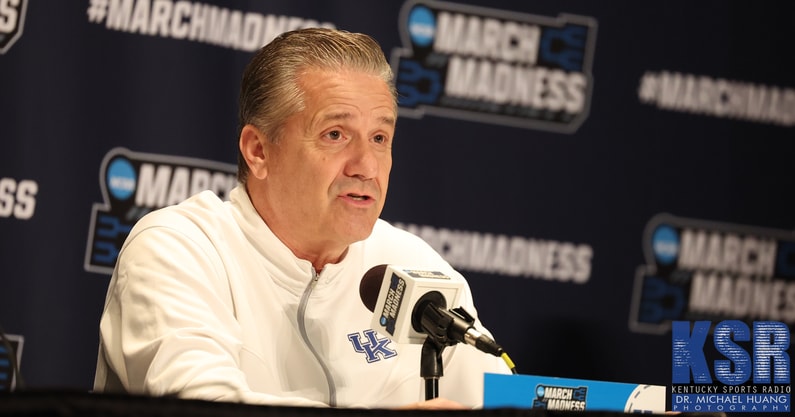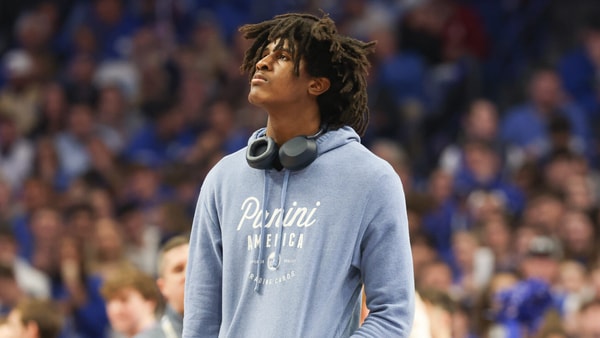John Calipari preparing for yet another roster rebuild at Kentucky

The Final Four consisted of a No. 4 in Connecticut, two No. 5s in San Diego State and Miami (FL) and a No. 9 seed in Florida Atlantic, the Huskies and Aztecs both advancing to the title game Monday evening in Houston. It was a semifinal Saturday featuring loads of veteran talent and minimal blue-chip rookies, grown men competing for a spot in the championship.
Kentucky head coach John Calipari watched, and he did so in person down in Houston at the Final Four. He saw the transfer-heavy, vet-heavy model work with his own two eyes, an approach that’s exploded since COVID-19 provided an extra year of eligibility for everyone in college basketball, along with the one-time transfer rule being implemented. The Wildcats tried the approach — two five-star recruits playing alongside transfers from West Virginia, Rhode Island, Illinois State, Iowa and Georgia — but didn’t make it past the Round of 32.
UConn, SDSU, Miami and FAU proved, though, it could be done.
“Is this a crazy Final Four? The parity — the kids through Covid being a little bit older, guys taking transfers and all this, it’s changed our game, but the excitement hasn’t changed. It’s craziness,” Calipari said in a public media appearance at the Final Four. “I’ve had to have different teams every year I’ve coached, so I kind of get this. Other guys are doing it, and I’ll be honest, they’re doing a pretty good job of it.”
It’s tough. Bringing in new pieces from different levels of college basketball, building a roster with chemistry and style of play in mind, the challenge is very real. We saw Kentucky hit rock bottom trying to adjust and adapt this season alone.
“The first time you do it, you’re changing your team every year, it changes how you play a little bit,” Calipari added. “You can’t say, ‘This is exactly how we’re playing.’ You say, ‘This is how we want to play’ and then you start going and it’s, ‘We can’t play that way, we’ve got to play different.’ I went through that with the team I coached this year.
“The other side of this, some kids are older. If a kid is 25 or 26 playing against a 19-year-old, it’s a big difference. I’m going to tell you where the difference is, it’s not just physically, they’re more mature. Mentally, they’ve been through more, they’ve had to overcome things. Now all of a sudden, guy has a beard and a kid, so it’s a different deal. We’re all trying to figure out how we do this.”
Calipari’s next challenge? Figuring out how to mix both in 2023-24, building the right recipe of portal additions to complement the five high-profile recruits he has coming in next season. And that’s on top of juggling the players on the current roster with difficult stay-or-go decisions themselves.
How can you hit the portal hard and consider taking commitments when you don’t know how many roster spots will be available? How do you talk about fit and potential role with interested transfers when so much is up in the air with the guys already on campus? That’s the problem he’s facing currently.
Top 10
- 1Breaking
Pop Isaacs
Creighton guard commits to Houston
- 2
Final AP Poll
Basketball Top 25 released
- 3Hot
Way-Too-Early Top 25
Looking ahead to 2025-26 hoops
- 4
Nick Saban
Nominated for Emmy
- 5Trending
Hailey Van Lith
Stuns as SI Swimsuit cover model
Get the On3 Top 10 to your inbox every morning
By clicking "Subscribe to Newsletter", I agree to On3's Privacy Notice, Terms, and use of my personal information described therein.
“I have not done much in the portal this year. I know our name is out there, but I’m still trying to figure out what my team looks like,” Calipari said. “Cason (Wallace) and Jacob (Toppin) are definitely in the draft, staying. Oscar (Tshiebwe) will be putting his name in the draft, maybe staying (in). Chris (Livingston) — well, we’ve got a lot of guys that will probably put their name in, so I’ve got to weave through that first to figure out who we have coming back.”
Is it a predicament — a pretty tough one, at that? Sure. But It’s an opportunity and challenge he’s embracing and grateful for. At the end of the day, he knows other coaches across the sport would kill to have his job and the chance to change lives the way Calipari can and is in Lexington.
And if that means rebuilding yet another roster this offseason and dealing with all of the moving parts that come with it, so be it.
“When you go through some seasons at a Kentucky, the thing I’ve got to tell you is, if I’m ever feeling sorry for myself — what? I’ve been blessed to be able to coach at Kentucky, even in the bad times,” Calipari said. “I know other guys say, ‘I want to coach at Kentucky, I don’t care,’ so I am blessed to be able to do what I’m doing.
“The reason is Kentucky is a stage I can really help kids compete for national titles. You can really help kids. Our kids in the NBA, what they’ve been able to do with their lives, they’ve made over $3 billion.”









Discuss This Article
Comments have moved.
Join the conversation and talk about this article and all things Kentucky Sports in the new KSR Message Board.
KSBoard